Unit 3 Conservation Writing Workshop课件(共34张,内嵌视频)-高中英语北师大版(2019)选择性必修第一册(共35页PPT)
文档属性
| 名称 | Unit 3 Conservation Writing Workshop课件(共34张,内嵌视频)-高中英语北师大版(2019)选择性必修第一册(共35页PPT) | 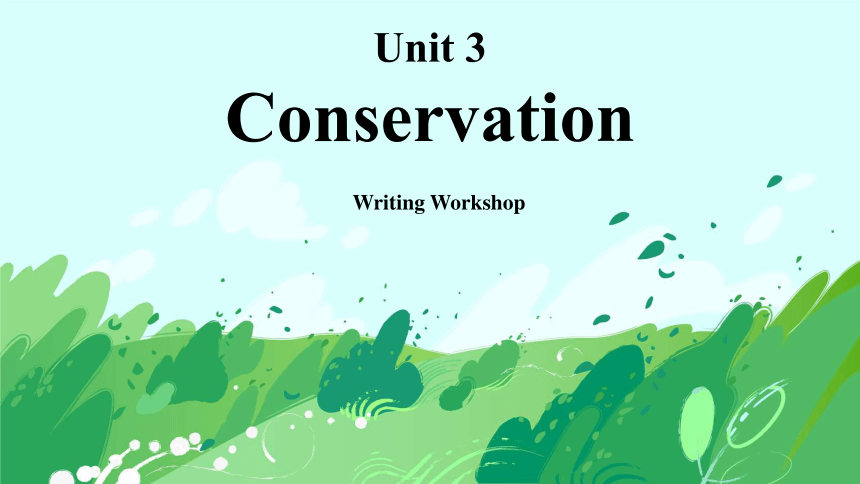 | |
| 格式 | pptx | ||
| 文件大小 | 46.4MB | ||
| 资源类型 | 教案 | ||
| 版本资源 | 北师大版(2019) | ||
| 科目 | 英语 | ||
| 更新时间 | 2025-08-01 10:23:32 | ||
图片预览

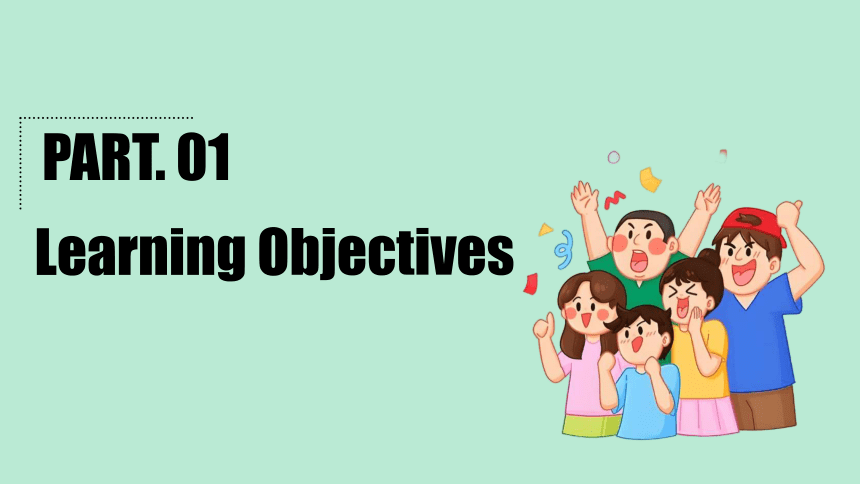
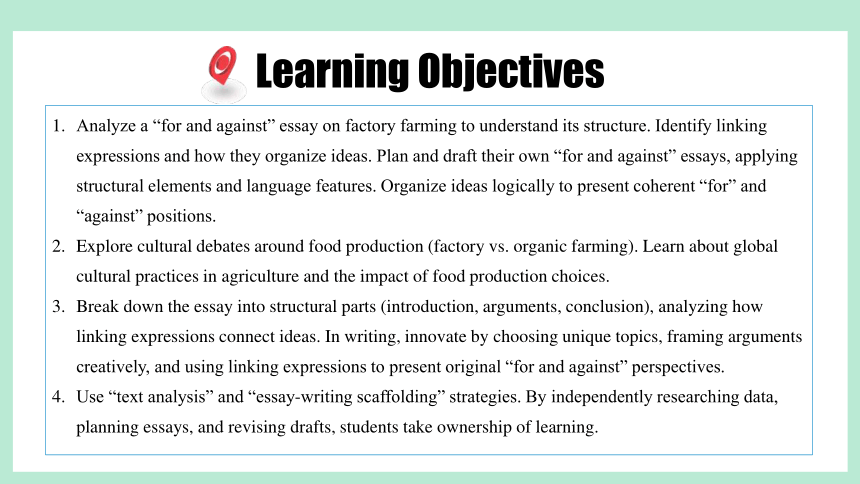
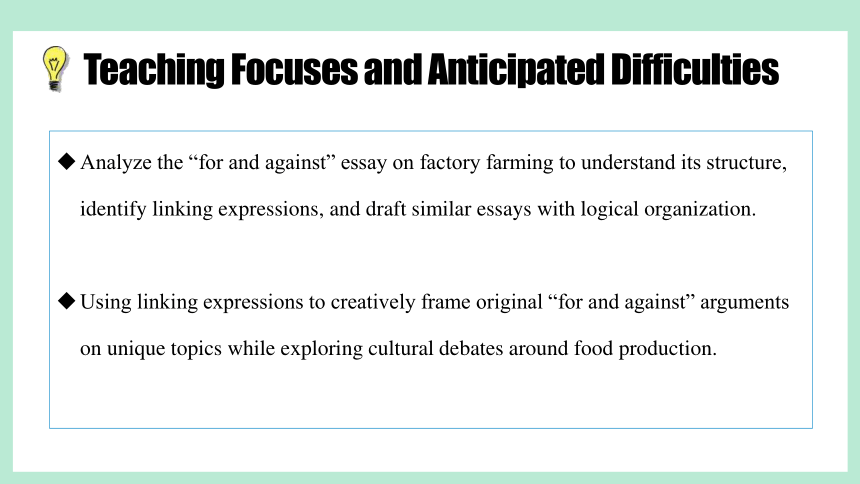

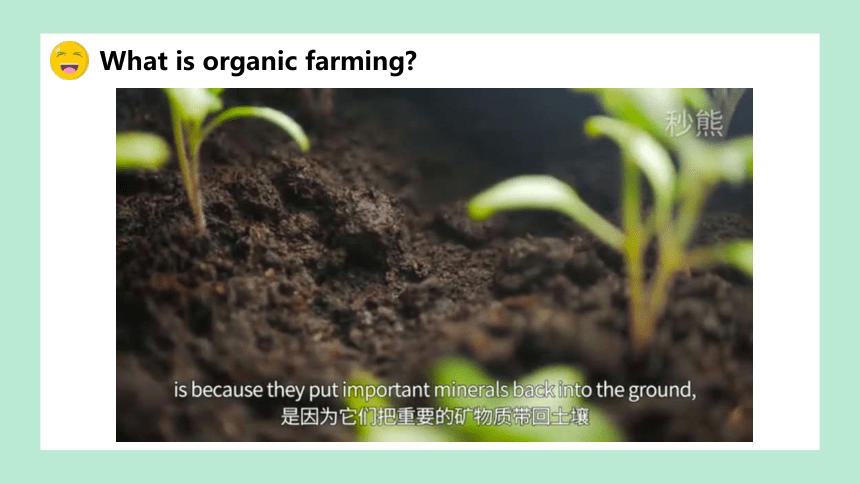

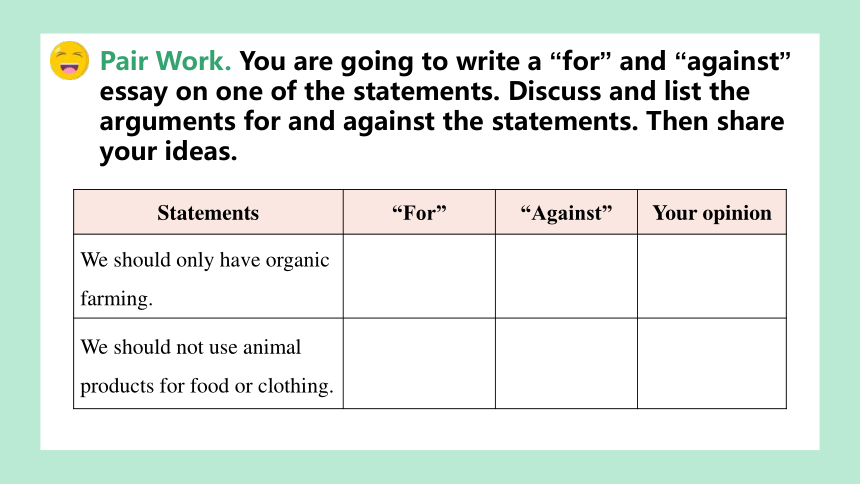
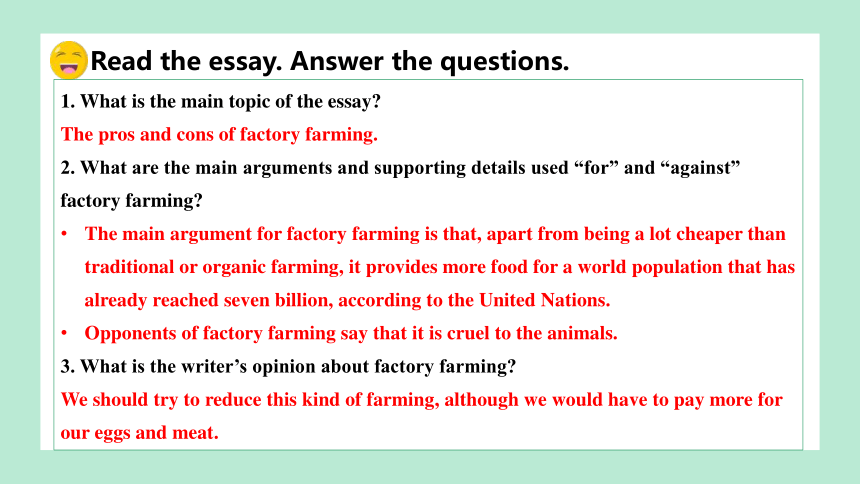
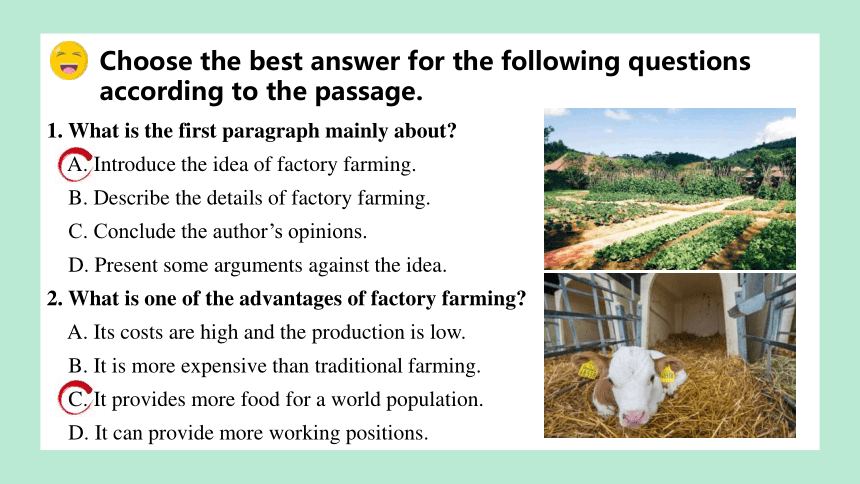
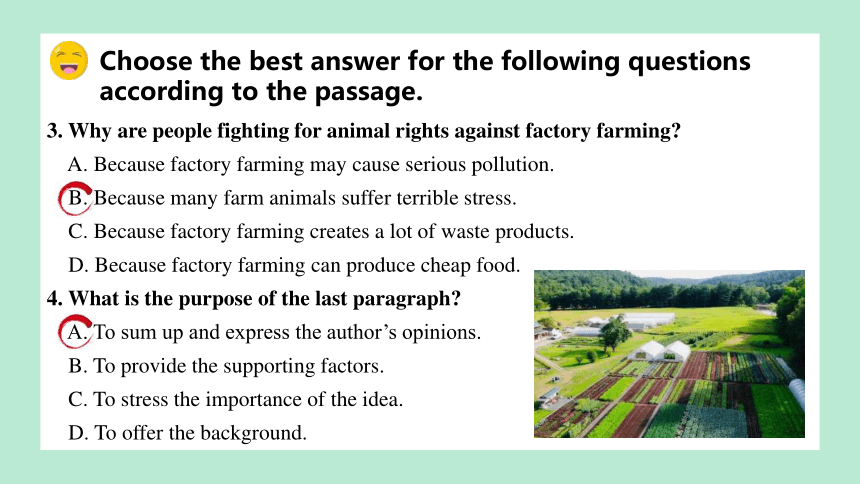
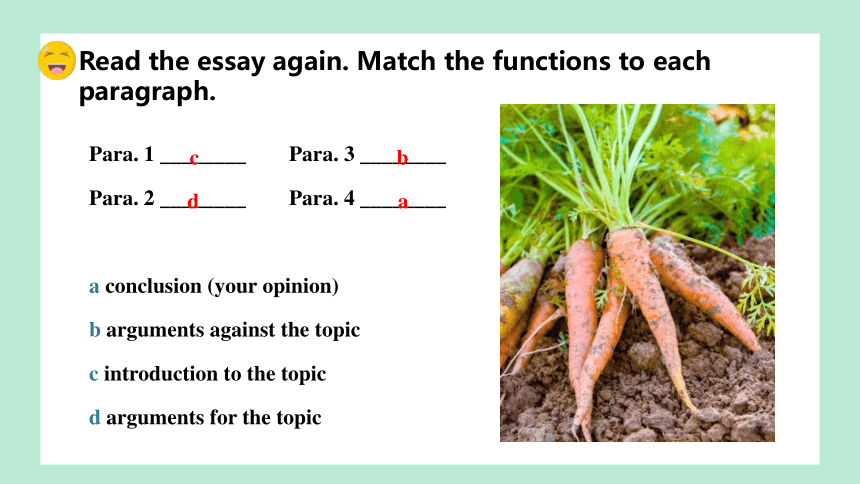
文档简介
(共34张PPT)
Unit 3
Conservation
Writing Workshop
Learning Objectives
PART. 01
Understand the daily study and life of British middle school students by watching videos. Based on your own daily study and life, compare the study and life in Chinese and British schools, and find out the similarities and differences between the two. Talk about your first impression of high school life, and have a preliminary perception of the study and life in the senior high school stage.
Learning Objectives
Analyze a “for and against” essay on factory farming to understand its structure. Identify linking expressions and how they organize ideas. Plan and draft their own “for and against” essays, applying structural elements and language features. Organize ideas logically to present coherent “for” and “against” positions.
Explore cultural debates around food production (factory vs. organic farming). Learn about global cultural practices in agriculture and the impact of food production choices.
Break down the essay into structural parts (introduction, arguments, conclusion), analyzing how linking expressions connect ideas. In writing, innovate by choosing unique topics, framing arguments creatively, and using linking expressions to present original “for and against” perspectives.
Use “text analysis” and “essay-writing scaffolding” strategies. By independently researching data, planning essays, and revising drafts, students take ownership of learning.
Understand the daily study and life of British middle school students by watching videos. Based on your own daily study and life, compare the study and life in Chinese and British schools, and find out the similarities and differences between the two. Talk about your first impression of high school life, and have a preliminary perception of the study and life in the senior high school stage.
Teaching Focuses and Anticipated Difficulties
Analyze the “for and against” essay on factory farming to understand its structure, identify linking expressions, and draft similar essays with logical organization.
Using linking expressions to creatively frame original “for and against” arguments on unique topics while exploring cultural debates around food production.
Lead-in
PART. 02
What is organic farming
Writing
PART. 03
Pair Work. You are going to write a “for” and “against” essay on one of the statements. Discuss and list the arguments for and against the statements. Then share your ideas.
Statements “For” “Against” Your opinion
We should only have organic farming.
We should not use animal products for food or clothing.
Read the essay. Answer the questions.
1. What is the main topic of the essay
The pros and cons of factory farming.
2. What are the main arguments and supporting details used “for” and “against” factory farming
The main argument for factory farming is that, apart from being a lot cheaper than traditional or organic farming, it provides more food for a world population that has already reached seven billion, according to the United Nations.
Opponents of factory farming say that it is cruel to the animals.
3. What is the writer’s opinion about factory farming
We should try to reduce this kind of farming, although we would have to pay more for our eggs and meat.
Choose the best answer for the following questions according to the passage.
1. What is the first paragraph mainly about
A. Introduce the idea of factory farming.
B. Describe the details of factory farming.
C. Conclude the author’s opinions.
D. Present some arguments against the idea.
2. What is one of the advantages of factory farming
A. Its costs are high and the production is low.
B. It is more expensive than traditional farming.
C. It provides more food for a world population.
D. It can provide more working positions.
Choose the best answer for the following questions according to the passage.
3. Why are people fighting for animal rights against factory farming
A. Because factory farming may cause serious pollution.
B. Because many farm animals suffer terrible stress.
C. Because factory farming creates a lot of waste products.
D. Because factory farming can produce cheap food.
4. What is the purpose of the last paragraph
A. To sum up and express the author’s opinions.
B. To provide the supporting factors.
C. To stress the importance of the idea.
D. To offer the background.
Read the essay again. Match the functions to each paragraph.
Para. 1 ________ Para. 3 ________
Para. 2 ________ Para. 4 ________
a conclusion (your opinion)
b arguments against the topic
c introduction to the topic
d arguments for the topic
c
d
b
a
Which of the linking expressions in the Sentence Builder has the following function
summarising information
adding new information
giving examples
providing sources of information
contrasting statements
Linking Expressions
according to
According to an institute, “74% of the world’s poultry ... are produced in this way”.
moreover
Moreover, factory-farmed animals suffer from fewer diseases ...
on the other hand
On the other hand, opponents of factory farming say that it is cruel to the animals.
Sentence Builder
Which of the linking expressions in the Sentence Builder has the following function
adding new information
providing sources of information
contrasting statements
for instance
For instance, many farm animals are kept in small spaces where they can hardly move.
in addition to
In addition to this, factory farming has a negative impact on the environment.
to sum up
To sum up, despite producing cheap food, factory farming is bad for the planet and for the animals themselves.
Sentence Builder
Which of the linking expressions in the Sentence Builder has the following function
summarising information
giving examples
adding new information
“支持”和“反对”的议论文
一、文体解读
此类文章属于正反对比类议论文,从正反两方面辩证地说明某个观点。正反对比类议论文在高考中占很大比例,是中学英语写作的重点体裁之一。
写此类作文时,一般采用三段式。首先提出问题,即点明人们是在什么问题上持有不同的观点,其次要对比陈述不同的观点和理由,最后就是要根据题目要求恰当地陈述一下自己的观点和理由,最好不要重复前面谈到的理由。
所用时态多为一般现在时。中心人称是第三人称。行文时要注意就事论事,对比要点要清晰完整,一目了然。
二、写作要点
导入:第1段
Recently we've had a discussion about whether we should...(导入话题)
Our opinions are divided on this topic.(观点有分歧)
正文:第2段
Most of the students are in favour of it.(正方观点)
Here are the reasons. First... Second... Finally... (列出2~3个赞成的理由)
第3段:
However, the others are strongly against it.(反方观点)
Their reasons are as follows. In the first place... What's more... In addition...(列出2~3个反对的理由)
结论:第4段
Personally speaking, the advantages overweigh the disadvantages, so I support it.(个人观点)
三、常用句式
1. Last week, we had a discussion about whether...
2. There are two different opinions about...
3. Some think that..., but others say/consider that...
4. Some students are for/agree to it, while but others are against/disagree to it.
5. On the one hand,... on the other hand...
6. Generally (speaking), more students think we should...
7. First,... Second,... Finally,...
8. Besides/ In addition/ Also/ Apart from it...
9. As a result,... Therefore,...
10. I have my own view about...
Write 2-3 arguments on the statement "We should only have organic farming." or "We should not use any animal products for food or clothing." Use the Sentence Builder to help you.
Search online to find data that can support your argument.
Outlining Complete the outline of your essay on the statement you have chosen based on Activity 3.
introduction to the topic
arguments for the topic
arguments against the topic
conclusion (your opinion)
Drafting Use your outline and the Writing Help to write your first draft.
Writing a “For” and “Against” Essay
It’s important to:
have a clear argument statement;
include “for” and “against” opinions;
support your own opinion with examples and other details;
sum up your argument in the final paragraph.
Writing Help
Editing Edit your essay in pairs. Then share what you have written in class.
Does the writer give a clear statement “for” or ”against” the issue
Does the structure flow well (statement, main argument with supporting details, other arguments and conclusion)
Does the writer use a variety of linking expressions
Do you feel that the writer has a strong belief in the argument he/she is presenting
Mark any spelling, punctuation or grammar error.
Mark any unclear expressions. Give suggestions if you can.
Underline the expressions you like.
Vocabulary
1. involve
involve sb in (doing) sth 使某人参与(做)某事;把某人牵扯到(做)某事里
involve in/into 使参与;使卷入
involvement n. 卷入;牵连;参与
be/get/become involved in sth/with sb 与某事有关系/与某人有关联
例题:
Teachers often involve students ______ group discussions, believing that sharing ideas helps them understand topics more deeply.
in
Vocabulary
2. opponent
oppose vt. 反对
opposed adj. 反对的,不同的;敌对的
be opposed to 反对……
as opposed to (表示对比)而,相对于
opposing adj. 对抗的;相反的
opposition n. 反对;反抗
Vocabulary
2. opponent
opposite prep. 与……相对;在……对面
adj. 对面的;相反的;迥然不同的
n. 对立的人(或物);对立面;反面
be opposite from 与……对立;不相容
be opposite to 在……对面,与……相反;反对……
例题:
They are all opposed ______ naming the high school after Martin.
to
Exercise
PART. 04
1. The researcher’s c_______(声称) that coffee causes heart disease has been challenged by other studies, which found no direct link.
2. Her family prefers o_______(有机的) vegetables, grown without pesticides or chemical fertilizers, believing they’re healthier and better for the environment.
3. The local i________(机构) for the elderly provides free health check-ups, fitness classes, and counseling services to support senior residents.
4. Good teachers adapt to students’ needs; for i_________(例子), a math teacher might use games to help visual learners understand equations.
laim
Exercise: 单词拼写
rganic
nstitute
nstance
1. The team practiced day and night to prepare for the final match, knowing their __________(oppose) had won every game this season.
2. The teacher encouraged students to get _________(involve) in community service, believing it builds responsibility and empathy.
3. She felt hurt when her classmates laughed _________(cruel) at her accent, making fun of the way she pronounced certain words.
4. The students wore gloves during the __________(chemistry) reaction, as the mixture could irritate skin if touched directly.
opponent
Exercise: 用所给词的适当形式填空
involved
cruelly
chemical
Summary
PART. 05
Writing Workshop
Vocabulary
arguments against the topic
Writing
involve, opponent
arguments for the topic
introduction to the topic
conclusion (your opinion)
Homework
PART. 06
Find out more about the advantages and disadvantages of organic farming.
Polish your writing.
Homework
See you next class!
Unit 3
Conservation
Writing Workshop
Learning Objectives
PART. 01
Understand the daily study and life of British middle school students by watching videos. Based on your own daily study and life, compare the study and life in Chinese and British schools, and find out the similarities and differences between the two. Talk about your first impression of high school life, and have a preliminary perception of the study and life in the senior high school stage.
Learning Objectives
Analyze a “for and against” essay on factory farming to understand its structure. Identify linking expressions and how they organize ideas. Plan and draft their own “for and against” essays, applying structural elements and language features. Organize ideas logically to present coherent “for” and “against” positions.
Explore cultural debates around food production (factory vs. organic farming). Learn about global cultural practices in agriculture and the impact of food production choices.
Break down the essay into structural parts (introduction, arguments, conclusion), analyzing how linking expressions connect ideas. In writing, innovate by choosing unique topics, framing arguments creatively, and using linking expressions to present original “for and against” perspectives.
Use “text analysis” and “essay-writing scaffolding” strategies. By independently researching data, planning essays, and revising drafts, students take ownership of learning.
Understand the daily study and life of British middle school students by watching videos. Based on your own daily study and life, compare the study and life in Chinese and British schools, and find out the similarities and differences between the two. Talk about your first impression of high school life, and have a preliminary perception of the study and life in the senior high school stage.
Teaching Focuses and Anticipated Difficulties
Analyze the “for and against” essay on factory farming to understand its structure, identify linking expressions, and draft similar essays with logical organization.
Using linking expressions to creatively frame original “for and against” arguments on unique topics while exploring cultural debates around food production.
Lead-in
PART. 02
What is organic farming
Writing
PART. 03
Pair Work. You are going to write a “for” and “against” essay on one of the statements. Discuss and list the arguments for and against the statements. Then share your ideas.
Statements “For” “Against” Your opinion
We should only have organic farming.
We should not use animal products for food or clothing.
Read the essay. Answer the questions.
1. What is the main topic of the essay
The pros and cons of factory farming.
2. What are the main arguments and supporting details used “for” and “against” factory farming
The main argument for factory farming is that, apart from being a lot cheaper than traditional or organic farming, it provides more food for a world population that has already reached seven billion, according to the United Nations.
Opponents of factory farming say that it is cruel to the animals.
3. What is the writer’s opinion about factory farming
We should try to reduce this kind of farming, although we would have to pay more for our eggs and meat.
Choose the best answer for the following questions according to the passage.
1. What is the first paragraph mainly about
A. Introduce the idea of factory farming.
B. Describe the details of factory farming.
C. Conclude the author’s opinions.
D. Present some arguments against the idea.
2. What is one of the advantages of factory farming
A. Its costs are high and the production is low.
B. It is more expensive than traditional farming.
C. It provides more food for a world population.
D. It can provide more working positions.
Choose the best answer for the following questions according to the passage.
3. Why are people fighting for animal rights against factory farming
A. Because factory farming may cause serious pollution.
B. Because many farm animals suffer terrible stress.
C. Because factory farming creates a lot of waste products.
D. Because factory farming can produce cheap food.
4. What is the purpose of the last paragraph
A. To sum up and express the author’s opinions.
B. To provide the supporting factors.
C. To stress the importance of the idea.
D. To offer the background.
Read the essay again. Match the functions to each paragraph.
Para. 1 ________ Para. 3 ________
Para. 2 ________ Para. 4 ________
a conclusion (your opinion)
b arguments against the topic
c introduction to the topic
d arguments for the topic
c
d
b
a
Which of the linking expressions in the Sentence Builder has the following function
summarising information
adding new information
giving examples
providing sources of information
contrasting statements
Linking Expressions
according to
According to an institute, “74% of the world’s poultry ... are produced in this way”.
moreover
Moreover, factory-farmed animals suffer from fewer diseases ...
on the other hand
On the other hand, opponents of factory farming say that it is cruel to the animals.
Sentence Builder
Which of the linking expressions in the Sentence Builder has the following function
adding new information
providing sources of information
contrasting statements
for instance
For instance, many farm animals are kept in small spaces where they can hardly move.
in addition to
In addition to this, factory farming has a negative impact on the environment.
to sum up
To sum up, despite producing cheap food, factory farming is bad for the planet and for the animals themselves.
Sentence Builder
Which of the linking expressions in the Sentence Builder has the following function
summarising information
giving examples
adding new information
“支持”和“反对”的议论文
一、文体解读
此类文章属于正反对比类议论文,从正反两方面辩证地说明某个观点。正反对比类议论文在高考中占很大比例,是中学英语写作的重点体裁之一。
写此类作文时,一般采用三段式。首先提出问题,即点明人们是在什么问题上持有不同的观点,其次要对比陈述不同的观点和理由,最后就是要根据题目要求恰当地陈述一下自己的观点和理由,最好不要重复前面谈到的理由。
所用时态多为一般现在时。中心人称是第三人称。行文时要注意就事论事,对比要点要清晰完整,一目了然。
二、写作要点
导入:第1段
Recently we've had a discussion about whether we should...(导入话题)
Our opinions are divided on this topic.(观点有分歧)
正文:第2段
Most of the students are in favour of it.(正方观点)
Here are the reasons. First... Second... Finally... (列出2~3个赞成的理由)
第3段:
However, the others are strongly against it.(反方观点)
Their reasons are as follows. In the first place... What's more... In addition...(列出2~3个反对的理由)
结论:第4段
Personally speaking, the advantages overweigh the disadvantages, so I support it.(个人观点)
三、常用句式
1. Last week, we had a discussion about whether...
2. There are two different opinions about...
3. Some think that..., but others say/consider that...
4. Some students are for/agree to it, while but others are against/disagree to it.
5. On the one hand,... on the other hand...
6. Generally (speaking), more students think we should...
7. First,... Second,... Finally,...
8. Besides/ In addition/ Also/ Apart from it...
9. As a result,... Therefore,...
10. I have my own view about...
Write 2-3 arguments on the statement "We should only have organic farming." or "We should not use any animal products for food or clothing." Use the Sentence Builder to help you.
Search online to find data that can support your argument.
Outlining Complete the outline of your essay on the statement you have chosen based on Activity 3.
introduction to the topic
arguments for the topic
arguments against the topic
conclusion (your opinion)
Drafting Use your outline and the Writing Help to write your first draft.
Writing a “For” and “Against” Essay
It’s important to:
have a clear argument statement;
include “for” and “against” opinions;
support your own opinion with examples and other details;
sum up your argument in the final paragraph.
Writing Help
Editing Edit your essay in pairs. Then share what you have written in class.
Does the writer give a clear statement “for” or ”against” the issue
Does the structure flow well (statement, main argument with supporting details, other arguments and conclusion)
Does the writer use a variety of linking expressions
Do you feel that the writer has a strong belief in the argument he/she is presenting
Mark any spelling, punctuation or grammar error.
Mark any unclear expressions. Give suggestions if you can.
Underline the expressions you like.
Vocabulary
1. involve
involve sb in (doing) sth 使某人参与(做)某事;把某人牵扯到(做)某事里
involve in/into 使参与;使卷入
involvement n. 卷入;牵连;参与
be/get/become involved in sth/with sb 与某事有关系/与某人有关联
例题:
Teachers often involve students ______ group discussions, believing that sharing ideas helps them understand topics more deeply.
in
Vocabulary
2. opponent
oppose vt. 反对
opposed adj. 反对的,不同的;敌对的
be opposed to 反对……
as opposed to (表示对比)而,相对于
opposing adj. 对抗的;相反的
opposition n. 反对;反抗
Vocabulary
2. opponent
opposite prep. 与……相对;在……对面
adj. 对面的;相反的;迥然不同的
n. 对立的人(或物);对立面;反面
be opposite from 与……对立;不相容
be opposite to 在……对面,与……相反;反对……
例题:
They are all opposed ______ naming the high school after Martin.
to
Exercise
PART. 04
1. The researcher’s c_______(声称) that coffee causes heart disease has been challenged by other studies, which found no direct link.
2. Her family prefers o_______(有机的) vegetables, grown without pesticides or chemical fertilizers, believing they’re healthier and better for the environment.
3. The local i________(机构) for the elderly provides free health check-ups, fitness classes, and counseling services to support senior residents.
4. Good teachers adapt to students’ needs; for i_________(例子), a math teacher might use games to help visual learners understand equations.
laim
Exercise: 单词拼写
rganic
nstitute
nstance
1. The team practiced day and night to prepare for the final match, knowing their __________(oppose) had won every game this season.
2. The teacher encouraged students to get _________(involve) in community service, believing it builds responsibility and empathy.
3. She felt hurt when her classmates laughed _________(cruel) at her accent, making fun of the way she pronounced certain words.
4. The students wore gloves during the __________(chemistry) reaction, as the mixture could irritate skin if touched directly.
opponent
Exercise: 用所给词的适当形式填空
involved
cruelly
chemical
Summary
PART. 05
Writing Workshop
Vocabulary
arguments against the topic
Writing
involve, opponent
arguments for the topic
introduction to the topic
conclusion (your opinion)
Homework
PART. 06
Find out more about the advantages and disadvantages of organic farming.
Polish your writing.
Homework
See you next class!
同课章节目录
- Unit 1 Relationshis
- Lesson 1 Teachers
- Lesson 2 How Do We Like Teachers’ Feedback?
- Lesson 3 So Close,Yet So Fa
- Unit 2 Success
- Lesson 1 Money vs Success
- Lesson 2 Top Five Secrets of Success
- Lesson 3 Getting to the Top
- Unit 3 Conservation
- Lesson 1 The Sixth Extinction
- Lesson 2 War on Plastic Packets
- Lesson 3 The Road to Destruction
